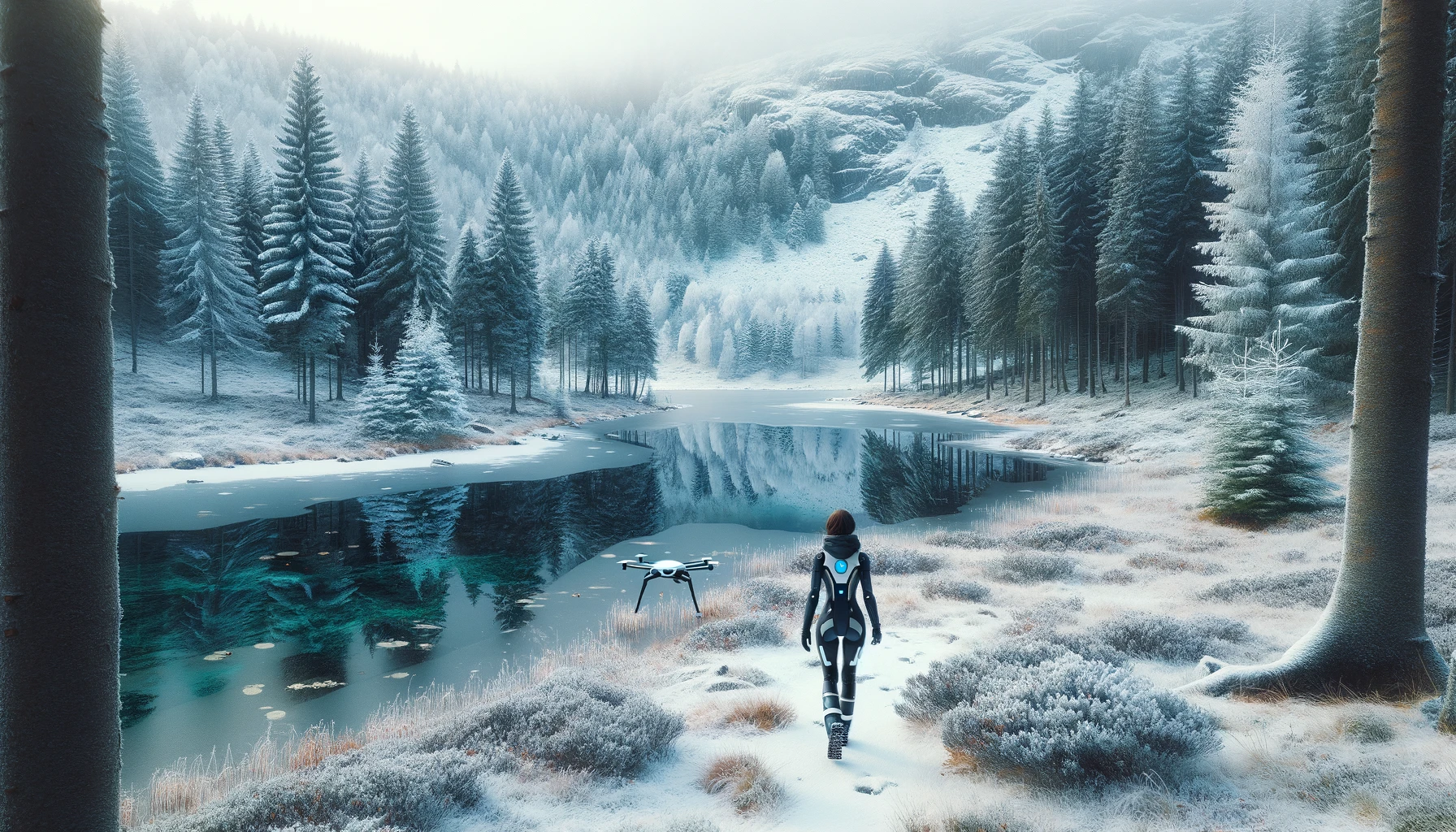This short story is an exploration of a world and characters destined for a novel. It's very much a work in progress, and I welcome your thoughts and feedback. Stay tuned for Part 3 coming soon.
An hour had passed since Ellen's experience with the ladder and the sky was now a blanket of deepening blues and grays. Ellen neared the warm glow of Maya's cabin, nestled in the heart of Norway's tranquil woodlands. Before she could knock, the door swung open, a silent signal from Allyx to Maya, merging technology with tradition. A welcoming heat rushed forth, wrapping Ellen in the kind of comforting embrace only an old friend's home could provide.
Maya's cabin was a sanctuary of warmth and shared joy in the cold Nordic landscape. The air inside was alive with the scent of stew, a blend of earthy root vegetables and aromatic herbs that promised nourishment for both body and soul. Illuminated by the soft glow of candles and the crackle of the fireplace, the cabin was all plush textures.
"Allyx," Maya called out as they settled at the dining table, "could you pull up that article on ancient woodworking I mentioned earlier?"
A subtle chime signaled Allyx's attention, and within moments, the information was seamlessly integrated into their discussion, displayed on the wall screen. Ellen's own Allyx chimed in with additional insights, the AI's conversing in a harmonious exchange of data.
As the dinner progressed, the conversation flowed naturally between them all with the Allyx devices offering context, humor, and facts, enhancing the dialogue without dominating it. Their voices were a familiar presence, each tailored to their human counterpart's preferences and personalities.

It was only as they were savoring the last bites of their meal that Maya's Allyx made a polite announcement. "Maya, Ellen, as per the Solitude Hours protocol, we will be deactivating shortly. Please let me know if there's anything else you need before then."
Ellen's Allyx followed suit, "Ellen, if you have any final requests for the evening, now is the time."
The women exchanged a glance, a silent acknowledgment of the impending solitude. "I think we're good, thank you," Maya responded, with Ellen nodding in agreement.
With another chime, softer this time, the glow from the tiny dots on their temples faded out, leaving a faint afterimage before disappearing completely.
Now in the company of silence, save for their own voices, Ellen recounted her unexpected paralysis on the roof. Maya listened intently, her brows furrowed in thought.
"You know, Ellen," Maya began her voice rich with the soft lilt of Norwegian accented English, "Have you ever heard of 'friluftsliv'?" she asked. At Ellen's shake of the head, Maya continued, "It's a philosophy we live by here, a way of life that finds joy and peace in nature. It's about connecting with the world around us, finding our place within it rather than trying to control or conquer it."
Ellen listened, her thoughts adrift.
"It sounds to me, like your fear might be a disconnection from the world, a sort of... imbalance. 'Friluftsliv' teaches us that by stepping into nature, embracing its unpredictability and grandeur, we can learn to let go of our need for control. It could be that by spending more time in the open air, in the forests, by the lakes, you might find a way to understand your fear, to let it exist without letting it rule you."
The idea seemed almost radical to Ellen, yet intrinsically right. To confront her fear by immersing herself in the very element that stirred it, to seek understanding and peace in the embrace of the Norwegian wilderness, this was a path she hadn't considered.
"Nature doesn't rush, yet everything is accomplished," Maya finished with a smile. "Perhaps, in the stillness of the woods or the solitude of the mountains, you'll find your answers. Here, we believe that being in nature, embracing the elements, it has a way of teaching us about ourselves. There's a strength in being part of the larger world, a kind of courage that you draw from the earth, the mountains, the vast skies."
Ellen's thoughts lingered on the advice from her friend. It didn't instruct her to dismiss her fear, but rather to understand it as an integral part of life's spectrum of experiences. For the first time, fear wasn't an emotional response to be quashed by the AI’s interventions. It was something more raw and less defined—a vital piece of her existence that connected her to the world in a way she had never known.
The exhilaration she felt wasn't due to the danger itself, but rather the liberty it represented—a break from the overprotective watch of her AI guardian. Her society's pursuit of safety had always felt suffocating, but now she recognized an underlying truth: she was drawn to the very thing her life had been designed to avoid.
The realization was as startling as it was invigorating. She didn't just encounter fear; she found herself craving the rush that came with it. This wasn't about seeking danger for its own sake—it was about the thrill of exploring the previously inaccessible, the magnetism of what had always been labeled as off-limits.
Ellen was coming to terms with a profound truth: the guarded life she had known didn't just keep her safe from harm—it also kept her from fully living. The fear, the potential for actual harm, was part of the human experience she had been unknowingly starved of. Acknowledging this, she felt a twinge of excitement—a hidden part of herself that had been waiting for the chance to break free and truly engage with the world, risks and all.


